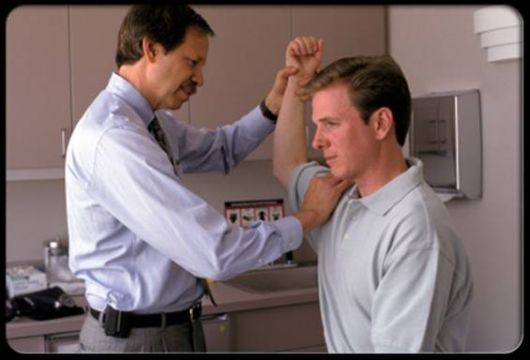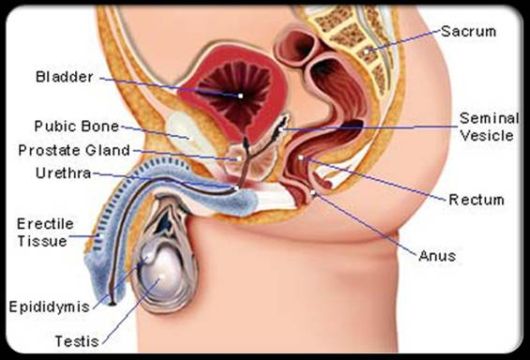|
Ryan Martis
|
 |
« on: July 01, 2011, 02:19:03 AM » |
|
 See Your Doctor When Symptoms Occur, and Get Regular Checkups. See Your Doctor When Symptoms Occur, and Get Regular Checkups.
Experts say that men could benefit greatly by being alert to certain cancer symptoms that indicate a trip to the doctor's office sooner rather than later. Some of those cancer symptoms in men are specific. They involve certain body parts and may even point directly to the possibility of cancer (for example, a mass in the scrotum or testicle). Other symptoms are not specific. For instance, pain that affects many body parts could have dozens of explanations and may not be cancer; however, that circumstance doesn't mean you can rule out cancer without seeing a doctor.
The following slideshow of pictures explain 15 symptoms and possible clues to finding cancer early. Unfortunately, many men ignore these symptoms with the result of sometimes discovering a cancer that might have been more easily treated if the cancer had been detected at an earlier date in its development.
|
|
|
|
|
|
Ryan Martis
|
 |
« Reply #1 on: July 01, 2011, 02:20:00 AM » |
|
No.1 - Breast Mass
If you're like most men, you've probably never considered the possibility of having breast cancer. Although it's not common, it is possible. According to Leonard Lichtenfeld, MD, deputy chief medical officer for the national office of the American Cancer Society, "Any new mass in the breast area of a man needs to be checked out by a physician."
In addition, the American Cancer Society identifies several other worrisome signs involving the breast that men as well as women should take note of. They include skin dimpling or puckering nipple retraction redness or scaling of the nipple or breast skin and nipple discharge.
When you consult your physician about any of these signs, expect the doctor to take a careful history and do a physical exam. Then, depending on the findings, the doctor may order a mammogram, a biopsy, or other tests.
|
|
|
|
|
|
Ryan Martis
|
 |
« Reply #2 on: July 01, 2011, 02:20:26 AM » |
|
No. 2 - Persistent Pain or Discomfort in Any Body Area
As they age, people often complain of more aches and pains. But pain, as vague as it may be, can be an early symptom of some cancers although most pain complaints are not from cancer.
Any pain that persists, according to the American Cancer Society, should be checked out by your physician. The doctor can take a careful history, get more details, and then decide whether further testing is necessary. If the cause of the pain is not cancer, you will still benefit from the visit to the office because the doctor can work with you to find out what's causing pain and help you know what may be done to treat the cause.
|
|
|
|
|
|
Ryan Martis
|
 |
« Reply #3 on: July 01, 2011, 02:20:43 AM » |
|
No 3. - Changes in the Testicles or Scrotum
Testicular cancer occurs most often in men aged 20 to 39. The American Cancer Society recommends that men get a testicular exam by a doctor as part of a routine cancer-related checkup. Some doctors suggest a monthly self-exam. Any change in the size of the testicles, such as growth or shrinkage, should be a concern. In addition, swelling or a lump or a feeling of heaviness in the scrotum should not be ignored. Some testicular cancers occur very quickly, so early detection is especially crucial.
|
|
|
|
|
|
Ryan Martis
|
 |
« Reply #4 on: July 01, 2011, 02:22:12 AM » |
|
No. 4 - Changes in the Lymph Nodes (Swelling, Painful, Warm and/or Reddish Color)
If you notice a lump or swelling in the lymph nodes under your armpit or in your neck -- or anywhere else -- it could be a reason for concern, says Hannah Linden, MD. "If you have a lymph node that gets progressively larger, and it's been noticeable longer than a month, see a doctor," she says.
Your doctor will examine you and figure out any associated issues with a detailed medical history that could explain the lymph node enlargement, such as infection. If there is no infection, a doctor will typically order a biopsy and blood tests.
|
|
|
|
|
|
Ryan Martis
|
 |
« Reply #5 on: July 01, 2011, 02:22:28 AM » |
|
No. 5 - Fever (High Fever of > 103 F or Chronic Fevers, Usually More Than One Week)
If you've got an unexplained fever, it may indicate cancer. It could also be a sign of pneumonia or some other illness that needs treatment.
Most cancers will cause fever at some point. Often, fever occurs after the cancer has spread from its original site and invaded another part of the body. But it can also be caused by blood cancers such as lymphoma or leukemia, according to the American Cancer Society. It's best not to ignore a fever that can't be explained. Check with your doctor to find out what might be causing the fever. The doctor can help distinguish between acute and chronic fever causes and also help to determine if anything needs to be done for the patient emergently. Go to The NEXT Page for More Pictures >>> Go to The NEXT Page for More Pictures >>>
|
|
|
|
|
|
 LIFE & STYLE
LIFE & STYLE Health, Fitness and Nutrition
Health, Fitness and Nutrition Mens Cancer:15 Symptoms That Men Ignore
Mens Cancer:15 Symptoms That Men Ignore LIFE & STYLE
LIFE & STYLE Health, Fitness and Nutrition
Health, Fitness and Nutrition Mens Cancer:15 Symptoms That Men Ignore
Mens Cancer:15 Symptoms That Men Ignore
